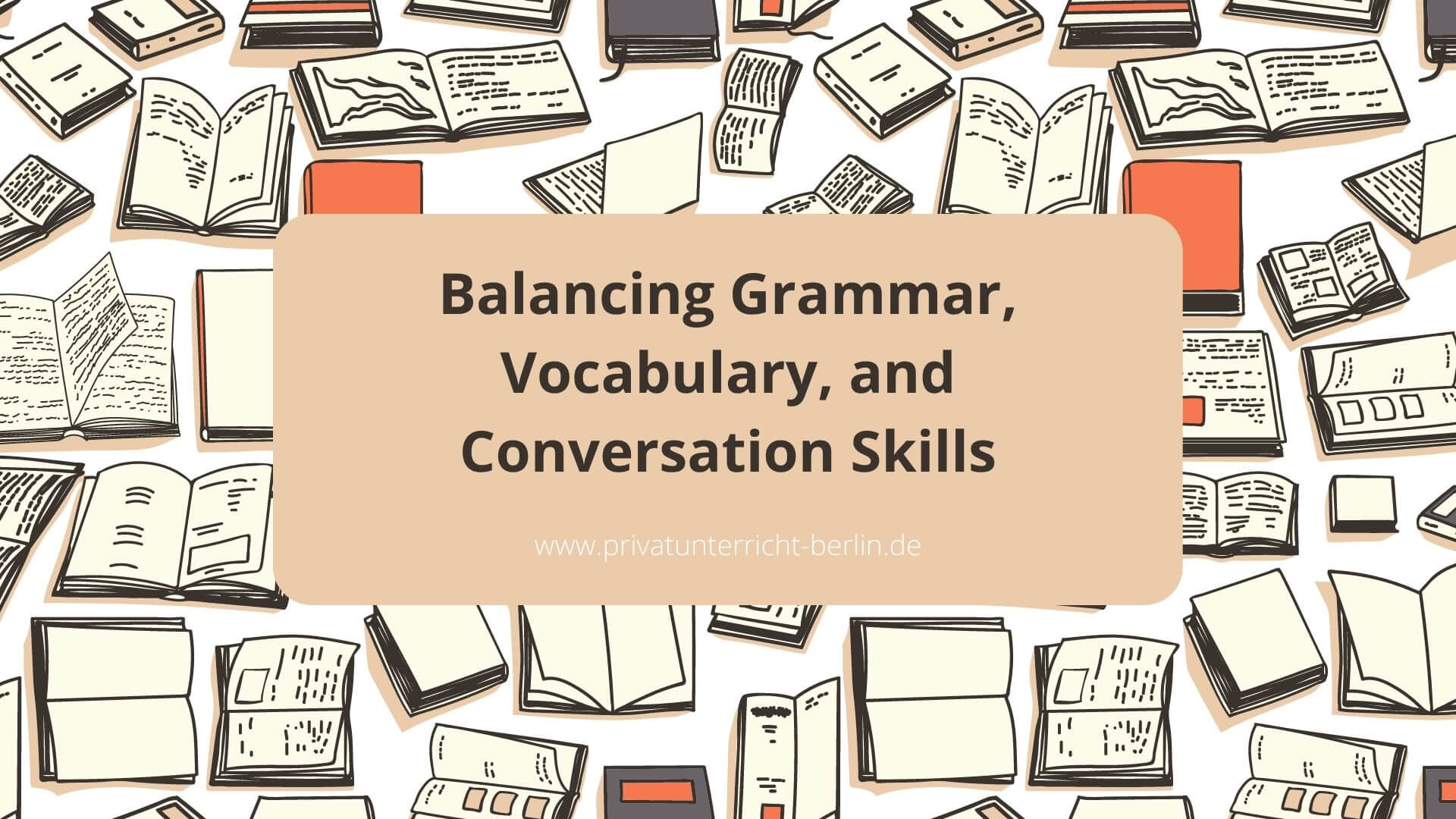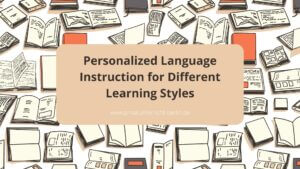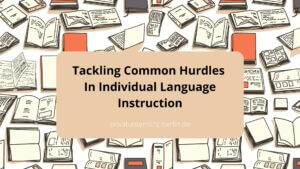Your Language Journey, Your Way: Start with a Private Tutor

Balancing Grammar Vocabulary And Conversation Skills
As a language learner, finding the right balance between grammar, vocabulary, and conversation skills is crucial.
While all these elements are essential for effective communication, focusing solely on one aspect can hinder your proficiency in others.
To become fluent in a language, you must master its grammatical rules, build an extensive vocabulary, and engage in meaningful conversations.
Grammar is often viewed as the foundation of any language-learning process. It provides learners with the tools to understand sentence structure and create coherent sentences that accurately convey meaning. However, relying too heavily on grammar can stifle creativity and make communication feel robotic or unnatural.
On the other hand, building a solid vocabulary allows learners to express themselves more fluidly and creatively, while conversational skills help them connect with native speakers at a deeper level.
In this article, we will discuss how balancing all three aspects can enhance fluency in any language.
Table of Contents
The Importance Of Grammar In Language Learning
Effective grammar teaching is a crucial component of language learning. It provides the foundation for effective communication and helps learners to develop accurate, meaningful sentences that convey their intended message.
However, many misconceptions about grammar can make it difficult for learners to understand its importance.
One common misconception is that grammar is a rule that must be memorized. In reality, grammar is much more than just a set of rules – it’s an essential tool for expressing ideas and communicating effectively with others.
Effective grammar instruction should focus on helping students understand how different parts of speech work together to create meaning in sentences. By understanding the role of each word or phrase in a sentence, learners can construct more complex and nuanced statements that accurately reflect their thoughts and feelings.
Building Your Vocabulary For Better Expression
Building a robust vocabulary is one of the keys to improving your conversation skills. The more words you know, the easier it is to express yourself clearly and effectively.
To expand your vocabulary, try incorporating word association into your daily routine. When you hear or read a new word, please try to associate it with other words you already know. For example, if you learn the word ‘quintessential,’ think of related terms like ‘typical,’ ‘representative,’ or ‘classic.’ This will help solidify the meaning in your mind and make it easier to recall when needed.
Another effective way to build your vocabulary is through contextual learning. Instead of simply memorizing lists of words, focus on learning them in context. Read books, articles, and news stories that interest you, and pay attention to unfamiliar words as they appear naturally in sentences. This will give you a better understanding of how the term is used and allow you to see its nuances and connotations.
Expanding your vocabulary is just one step towards becoming a skilled conversationalist. In addition to having a wide range of words at your disposal, using them appropriately in conversations is essential. This means being aware of what you say and how you say it – tone, inflection, and body language all play a role in effective communication.
To engage in meaningful conversations, focus on active listening rather than waiting for your turn to speak. Pay attention to verbal cues (like tone) and nonverbal cues (like facial expressions) so you can respond thoughtfully and empathetically. Remember that good conversation involves both speaking AND listening – strive for a balance between the two.
Engaging In Meaningful Conversations
Building your vocabulary is just the first step toward becoming a great communicator. To truly express yourself, you must also develop practical listening skills and learn to engage in meaningful conversations with others.
Combining your grammar knowledge, expanding your vocabulary, and practicing conversation techniques can create well-rounded communication abilities.
Effective listening is a crucial component of any conversation. It involves paying attention not only to what someone says but also to their tone and body language. Listening attentively shows respect for the speaker’s thoughts and feelings while gaining insights into our biases and assumptions.
Asking questions is another vital part of engaging in meaningful discussion; it allows us to clarify our understanding of the topic at hand while showing interest in the other person’s perspective. With practice, you can become an active listener who skillfully uses questioning techniques during conversations that lead to deeper levels of comprehension between speakers.
Finding the right balance between grammar, vocabulary, and conversational skills requires consistent effort. You should continue building your grammar knowledge by reading books or articles on grammar rules regularly – this will help solidify proper usage when speaking aloud or writing messages online!
Expanding your vocabulary by using new words daily keeps things fresh while improving expression capabilities within different contexts, such as work or social settings! Incorporating these elements alongside honing conversational skills like active listening and asking questions leads one closer to achieving greatness as an all-around communicator!
Finding The Right Balance Between Grammar, Vocabulary, And Conversational Skills
Did you know that according to a recent study, language learners who focus solely on grammar and vocabulary tend to struggle with conversation skills?
This is because the effective practice involves mastering grammar rules, building a robust vocabulary, and developing fluency in speaking.
One way to improve conversational skills is through language exchange programs. These programs allow individuals to converse with native speakers and gain valuable experience in communication.
In addition, participating in group discussions, debates, or role-playing activities can help learners become more comfortable expressing their ideas and opinions in real-time conversations.
By integrating these experiences into regular practice sessions, learners can enhance their speaking abilities and overall fluency.
Tips And Strategies For Enhancing Overall Fluency
To enhance overall fluency, learners can adopt various tips and strategies.
One of the most effective ways to improve language skills is by participating in language exchange programs. These programs allow learners to practice their conversation skills with native speakers of the target language. They also offer a chance to learn about different cultures and customs while gaining insight into real-life situations where the new language would be helpful.
Another way to boost fluency is through immersion experiences. This means surrounding oneself with the target language by traveling to a country where it’s spoken or spending time with native speakers who don’t speak your first language. Immersion experiences help learners develop an ear for the new language’s accent, tone, and rhythm and build confidence when saying it.
By constantly hearing and using the target language in everyday conversations, learners can accelerate their progress toward becoming fluent speakers. By adopting these tips and strategies, learners can improve their grammar and vocabulary and become more confident in their conversation skills.
Language exchange programs and immersion experiences provide unique opportunities for individuals to immerse themselves in a new culture while learning a new language simultaneously – making fluency attainable sooner than expected!
Frequently Asked Questions
What Is The Most Important Aspect Of Language Learning?
Did you know that over 1.5 billion people worldwide speak English? It’s no wonder that language learning has become increasingly important in today’s globalized world.
When mastering a new language, many argue that cultural immersion plays a crucial role in achieving fluency. However, the importance of pronunciation must be addressed too. As writers of grammar, vocabulary, and conversation skills material, we understand learners’ challenges in balancing these aspects of language acquisition.
But ultimately, the most critical aspect of language learning is effectively communicating with others in real-life situations. So while building your vocabulary and perfecting your grammar are necessary steps toward reaching this goal, don’t forget to practice your conversational skills!
How Can You Improve Your Grammar Skills?
Improving grammar skills is crucial in language learning.
Tools like Grammarly can help identify and correct common mistakes, enabling learners to communicate more effectively.
However, simply relying on technology isn’t enough.
Immersing oneself in the language through conversation with native speakers or watching TV shows and movies in the target language can also improve grammar skills by providing real-life examples of how words and phrases are used in context.
Incorporating technical assistance and practical application into one’s language learning routine can lead to well-rounded proficiency in grammar, vocabulary, and conversation skills.
What Is The Best Way To Build Your Vocabulary?
Word association and contextual learning are the best way to build your vocabulary.
Some may argue that memorizing long lists of words or using flashcards are also effective methods. However, those techniques need to include the essential element of context. Without proper context, it’s difficult for your brain to retain new information beyond a surface level.
Word association, on the other hand, connects new words with familiar ones in meaningful ways, making them easier to recall later on.
Contextual learning involves immersing yourself in real-life situations where you’re exposed to new vocabulary within its natural setting. Both approaches are more engaging and effective than traditional rote memorization techniques when expanding your lexicon while balancing grammar and conversation skills.
How Can You Become More Comfortable Engaging In Conversations In A Foreign Language?
You can try a few strategies to become more comfortable engaging in conversations in a foreign language.
One effective way is to participate in language exchange programs where you can practice speaking with native speakers of the target language.
Immersion programs are also great for improving your conversational skills because they allow you to immerse yourself fully in the language and culture.
In addition, it’s essential to build up your vocabulary to have the words necessary to communicate effectively.
However, don’t neglect grammar – even if you have an extensive vocabulary, incorrect grammar usage may hinder your ability to express yourself clearly.
By balancing grammar, vocabulary, and conversation skills through these methods, you can become more confident and fluent in your target language.
Is It Possible To Be Fluent In A Language Without Mastering Grammar And Vocabulary?
Fluency versus accuracy in language learning is a hotly debated topic. Some argue that fluency can only be achieved by mastering grammar and vocabulary, while others insist on the importance of accuracy for effective communication.
The role of immersion in developing language skills must be considered as it provides an opportunity to practice speaking and listening in real-world situations.
However, it’s important to note that relying solely on conversation skills without proper knowledge of grammar and vocabulary may lead to misunderstandings or even embarrassing mistakes.
In conclusion, achieving fluency requires a balance between all three aspects – grammar, vocabulary, and conversation skills – with immersion supporting solidifying these skills.
Conclusion
In conclusion, mastering grammar, vocabulary, and conversation skills are crucial to language learning. While some may argue that one is more important than the other, it’s essential to strike a balance between them to become fluent in a foreign language.
Improving your grammar skills can be achieved through consistent practice and by seeking resources like textbooks or online courses.
Building your vocabulary requires an active effort to learn new words regularly using flashcards or reading books in the target language.
Finally, becoming comfortable engaging in conversations in a foreign language can be helped by finding a native speaker willing to converse with you frequently.
As a writer specializing in helping people improve their grammar, vocabulary, and conversation skills, I implore learners not to neglect any of these areas, as they’re all interconnected.
By doing so, you’ll be able to communicate effectively with others and express yourself fluently in no time!
So don’t give up on your language-learning journey – keep striving for improvement every day!



